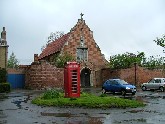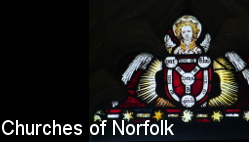| |
Our Lady
Star of the Sea, Wells
 |
|
Rain
was general, all over Wells. This little town is
at once charming and infuriating, but it does not
attract posh Londoners to the same extent as
neighbouring Burnham Market or Blakeney, and has
that rare thing in England in the 21st century -
a life of its own. Actually, it would be truer
to say that Wells has not actually reached the
21st century yet. I should estimate that it is up
to about 1970 - it reminds me of how England was
when I was about eight years old. Because of
this, all the shops (and, bless them, virtually
all of them are independently owned, hardly a
chain store in sight!) start closing at 5pm. This
wasn't great news in the rain, so we headed along
the narrow lanes until we reached a large square
unpromisingly entitled the Buttlands.
|
Well let
me say that if I should ever win the National Lottery, I
shall be heading straight to Wells to buy a house on the
Buttlands. It is stunning. A long green, surrounded on
four sides by large, fine early 19th century houses, most
of them with three bays. It is utterly gorgeous. I dare
say that my children would not thank me for moving them
to remote north-west Norfolk, and I expect that even for
me the novelty would wear off after about eighteen hours
or so (What? Nowhere to buy a loaf of bread on a
Sunday?!) but a man can dream. Pevsner gives the square a
whole paragraph, but it seemed to me a well-kept secret.
In the
corner of the square is a fine, late 19th century church
in a red-brick Dutch style. It is the Catholic Church of
Our Lady, Star of the Sea, the Stella Maris
dedication that must have been common to many East
Anglian coastal churches in the Middle Ages. There is a
little porch, and an added continental flavour of having
to go through an inner porch as well. Inside, the church
is simple, traditional, all eyes focused east. A stone
altar is surrounded by wooden panelling, and there are
two side chapels, one to the Annunciation and one to the
Sacred Heart.
Everything
is all of a piece, although the font struck me as rather
1930s in its dour bulkiness. There is a pretty wooden
gallery above the west door, although Our Lady is
probably not as strapped for space as most East Anglian
Catholic churches, because people can always zip six
miles down the road to the vast Church of the
Reconciliation at the National Shrine. Below the gallery
is a lovely statue of St Margaret Clitherow, the martyr
of York. The judge who sentenced her to death is buried
on the far side of East Anglia at Holbrook near Ipswich.
We stepped
out into the rain of the Buttlands again. What a
beautiful spot! I could live here quite comfortably,
sinning and confessing in the same square, getting out of
bed a few minutes before Sunday Mass, and then, after
Mass, going off in search of that elusive loaf of bread.
Ah, dreams.
Simon Knott, May 2005
|
|
